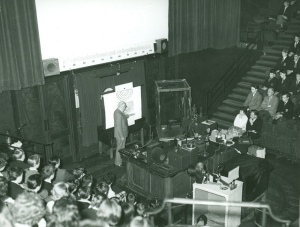Bias, Bringing it Up (Nicely?)
“He who passively accepts evil is as much involved in it as he who helps to perpetrate it. He who accepts evil without protesting against it is really cooperating with it.”
Martin Luther King, Jr.
 I absolutely agree with this. I have discussed in previous posts how important it is to speak up and speak out (here, here, here) that I think it is important to point out “bad” behavior. There is sometimes evil behavior, such as the string of sexual harassment issues plaguing astronomy lately, but most sexist or racist behavior is subtle and bad, but not outright evil. I advocate for the approach to pointing out the behavior be commensurate with the level of badness of the behavior. For instance, ass grabbing should be immediately shouted about and pointed out strongly. Unconscious bias by a generally nice person who doesn’t really realize doesn’t need to be screamed about – but discussed in a civilized manner. Sometimes that doesn’t work.
I absolutely agree with this. I have discussed in previous posts how important it is to speak up and speak out (here, here, here) that I think it is important to point out “bad” behavior. There is sometimes evil behavior, such as the string of sexual harassment issues plaguing astronomy lately, but most sexist or racist behavior is subtle and bad, but not outright evil. I advocate for the approach to pointing out the behavior be commensurate with the level of badness of the behavior. For instance, ass grabbing should be immediately shouted about and pointed out strongly. Unconscious bias by a generally nice person who doesn’t really realize doesn’t need to be screamed about – but discussed in a civilized manner. Sometimes that doesn’t work.
In this post, I am going to tell two stories of times I had to point this out. Judge for yourself how it went. Always open to comments and questions.
Story 1: Game Over. Earlier this year, I served again on a panel. I had discussed this panel in a previous post on the blog. If you read this prior story, you might get an idea that I was already a strike down with this panel. This year, the panel was virtual. I have also posted about how I dislike virtual panels (networking panels) – strike two. This panel was made worse this year because one of the men didn’t show up. So it was just me, one other guy, the program director, and the admin for the program on a conference call.
It started off badly on the first proposal. I was set to discuss. My comments were quite long and honestly harsh. I gave a 1/5 because the proposer used a ton of jargon that I didn’t understand, didn’t explain the significance of the work, and instead repeatedly stated, “This work is of great importance to the field,” without actually explaining *why* it was important. My critique was long and detailed to give feedback to the proposer so that they could do better next year. I ended my overview summary by saying, “I feel like this person is trying to pull a fast one on us to trick us into thinking this is great science when nothing was explained.”
The other guy on the panel said, “Huh, well I guess it worked because I gave him a 5/5” Indeed, he did, folks. And you want to know another thing? His only one sentence review said, “This proposal exudes confidence.” What do you think of that? “Exudes confidence.” Honestly, I thought we were reviewing scientific merit, but apparently, we are supposed to be reviewing confidence. Oh no, wait. We aren’t…. And that was the first proposal.
The rest of the panel I was repeatedly ignored by my co-panelist. I would ask him to explain his review, and he would say, “Just read the comments,” instead of answering me. He would be working on something else and then not hear what I said and talk over me and basically repeat exactly what I would say. We went through almost all the proposals like this. The other reviewer? He never logged on.
And then it happened. We had a couple reviews left, and we were discussing a proposal by a woman that I really liked. I was trying to enthusiastically defend this woman and be persuasive about why I liked it. The program officer told me that, despite my enthusiasm and his also, that the woman had mis-proposed and missed the point of the call for proposals. The woman’s cool proposal was outside the scope of the program. I was bummed, but understood.
Co-panelist was supposed to be taking notes and writing a summary, but didn’t seem to be paying attention to our conversation. Of course I don’t know for sure, but I am pretty sure because at about that point, co-panelist said very loudly, “Well this is just very naive! No one does this type of thing anymore! It is just terrible.”
And that is when I did it. I said, “I understand what you are saying, but I would prefer if you didn’t use that word to describe the work. Let’s make sure we aren’t calling it naive in the summary that she gets. She just misproposed and it is outside the scope for this call, but when you say she is naive, it is… I don’t know… it sounds like you are the master and she is the novice. She is a full professor who just mis-proposed.”
He responded, “But it is naive! No one does this type of research anymore. It isn’t novel. It isn’t good.”
I said, “I understand. I just think that naive is one of those words that people use for women and it is code, and I don’t want to use it. Can you use a different word?” And this is bad, folks, because this is where I started tearing up and crying a little. In my defense, I was tired, we just moved across the country for sabbatical, I had to get my kids out the door with neighbors to be on the call on time (and my co-panelist was late, of course), and the stress of having to fend off this jerks’ comments all morning was taking its toll. Oh, and the heat in my apartment was out, and I had not had time to call the landlord.
At this, and his realization that I was crying, co-panelist stated, “You think I’m sexist!”
I say, “No, I didn’t say that. We are all sexist. I am just saying that I don’t want to use that word.”
More denial, “You think I’m sexist! You are just saying this to shut me up. To oppress my opinion. My opinion is reasonable and scientific, and you want to shut me up because you disagree and want to squelch my opinion.”
And this was where I really lost it because I was now being attacked. And honestly, in thinking back, I never called him sexist in that conversation. I never tried to shut down his opinion. I truly just didn’t want to use that word, naive, because it is condescending and it is code for incompetent.
And guess what? It deteriorated so bad that we couldn’t continue the panel. At the end, the program officer called me, and I apologized to the program officer for losing it. I still was upset and crying. He suggested that I call the co-panelist and apologize to him. I never have because honestly, besides getting upset, I do not think I did anything wrong.
You want to know something else? I was removed from the panel. Co-panelist? He is staying. He is an older white, male, well-established, leader in the field. This is how he acts, and I get kicked off. Is that fair?
Story 2: That’a Boy. I have been holding onto the story above for a while because it still hurts to think about, and I wanted time to pass before I communicated it. But this week, I was empowered to tell it because I have another story of doing the same thing that was amazing. And here it is.
I am on an international committee to help organize policies for an open access repository of scientific papers. It is the biggest and oldest in the world, so you might have heard of it, and I won’t drop the name here. Anyway, we were discussing a particular woman for a position on a committee. One committee member brought up the fact that she has kids, but they were older, so she might be more available to serve. The committee chair brought up a more relevant point that the woman is doing outsized service (aren’t we all?), and may not have time for this extra service load.
After that discussion, I raised my hand, and said (probably not this well-stated), “In the future, when we are talking about people, can we not bring up their personal lives into the discussion? If she can or cannot serve should be her decision which she can make based on what she knows about her own private life, but we shouldn’t bring it up or speculate.”
The committee chair said, “Yes, I agree. It has no baring. We will ask her, and she will decide. We only need to decide to ask.”
And the first guy said, “Yeah, I only brought it up because another guy is leaving because of having a new baby.”
I said, “Yeah, but he brought that up. We didn’t speculate. He decided and told us. That’s the difference.” and my face must have been beat red by this point, dying of embarrassment, but pushing on because I felt it was important and right.
And the guy responded with, “I’m sorry. You’re probably right.”
And I almost about died of surprise and shock and gratitude for him and the chair of the committee. I looked at the other women in the room (yes, I wasn’t alone for once), and they smiled at me. And it felt amazing! Such a minor win, but so very important for me.
So, these two stories are reports, examples, of how you can respond to sexism, and how you cannot always control or even expect the response you will get. I think it is getting better. I think we can change. I have hope that my perseverance on this is not for nothing. I do not think I am in the same category at Martin Luther King, but his sentiment was not about special people. His words were about regular people. Regular people need to point things out, or they won’t get better. Protest is not meant to make people comfortable. I suppose what I do is a form of protest. It makes the transgressors more uncomfortable than the innocent. I suppose that is what my stories display more than anything else.
What do you think? Comment or post here. Push the +Follow button to get an email every time I post.
 Today, I would like to comment on student evaluations. I have talked about them before
Today, I would like to comment on student evaluations. I have talked about them before 






Recent Comments